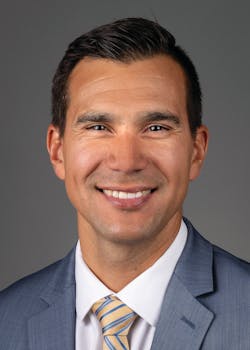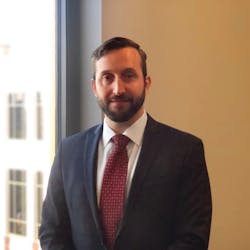The official motto for the HIMSS20 Global Health Conference & Exhibition, set to take place March 9 to March 13, is: “Be the change.” It comes from a quote attributed to Gandhi: “You must be the change you want to see in the world.”
The Chicago-based HIMSS (Healthcare Information and Management Systems Society) organization is asking its members and attendees to see themselves as “changemakers” passionate about harnessing the potential of information and technology to transform health. The nearly 45,000 attendees in Orlando will be able to choose from 350 sessions around 17 distinct topic areas, ranging from consumerization and patient experience to artificial intelligence and interoperability.
The conference will feature some efforts to highlight ways that technology can actually humanize healthcare delivery.
For instance, on Tuesday, March 10, Nusha Safabakhsh, the executive director of measurement and analytics at the Institute for Human Caring at Providence St. Joseph Health, based in Gardena, Calif., will give a talk on “The Power of Data to Transform and Humanize Healthcare.” Safabakhsh’s organization published quality-improvement reporting suites for clinical staff to monitor practices related to advance care planning, goals of care/shared decision making, symptom management, palliative care, and hospice care, borrowing heavily from the tenets of palliative care. The session is set up to show how to construct reporting suites and leverage analytics to help deliver more humanized, goal-aligned, cost-effective care.
This emphasis on whole-person care ties into a renewed commitment to equity and diversity at this year’s conference. The HIMSS Global Health Equity Session Series will explore the importance of different perspectives that result in richer, more creative and innovative solutions, which drive widespread, effective innovation to improve health outcomes for all. Attendees will engage in sessions focused on advancing health equity through supporting and sharing ideas/solutions around diversity and inclusion in the healthcare workforce. During this Session Series, executives will share their expertise on social determinants of health, race/ethnicity, gender and other factors that contribute to health disparities.
A cancer model for a learning health system
Brian Anderson, M.D., chief digital health physician of MITRE Corp., is going to give a talk titled, “mCODE: A Cancer Model for a Learning Health System.” He is leading an effort to develop a common data model in oncology called mCODE (minimal Common Oncology Data Elements) that is identifying cancer data elements that would be essential for analyzing treatment across electronic health records (EHRs) to allow cancer practices to improve quality and care coordination. MITRE is developing an mCODE-based SMART-on-FHIR application that will extract mCODE data in computable formats and deliver reports to providers and patients — thus empowering shared decision making.
“What mCode has done is define a minimal code set --- saying that we as a coalition of health systems are agreeing these are the elements we are going to capture in a semantically interoperable way so that the data endpoints are there to be transmitted to other health systems and application developers,” Anderson explains.
One of the critical areas of mCODE involves outcome status, he adds. “That is the most important category, because it takes other elements and coalesces them into how the patient is doing, and from a learning health system perspective, that is very critical. As you are developing analytic tools and insights, you want to understand what is working and what is not for patients.”
I asked Anderson who he hopes to reach amongst the HIMSS crowd. “We want to speak to researchers, such as clinical trial principal investigators who are developing new ways of conducting research leveraging real world data that mCODE can help enable,” he says. “We want to talk to the clinicians who want to leverage mCODe as well as patient advocacy groups that want to empower patients to own their data to access and share it with other health systems or developers. My role at HIMSS also involves helping the vendors understand the needs of the coalition of health system partners working on mCODE. They are saying they want mCODE to unlock the power of data in the silos of those health systems. That gets the attention of EHR vendors, so we are helping vendors understand the use cases of mCODE.”
Demystifying interoperability
At HIMSS, Paul Wilder, the new executive director of the CommonWell Health Alliance, is going to be speaking on an all-star panel session titled “Demystifying Interoperability, Information Blocking, and APIs: Clear guidance on improvement opportunities.”
Wilder says it is likely the ONC and CMS interoperability final rules are going to be fresh enough that “people are going to need that collegial place to get together and hash out what they don’t understand. I expect it will be 50 percent very easy to understand and a whole bunch of stuff where the reaction will be, ‘How does that affect me and what do I do now?’”
Wilder adds that he hopes to touch on some community success stories about data-sharing use cases that are becoming more common such as encounter notifications, but also to talk about some that are still in their early stages. “People are already doing direct patient access through tethered portals or curated tethered portals, but the idea of using an aggregated network for patients to access information without having to go find it piece by piece is still not fully tackled,” he notes, “and we are having conversations with partner organizations about how to make that more standardized.” More accurate patient matching solutions will be part of that conversation, Wilder adds.
How CommonWell can help with direct consumer access to data is the topic Wilder says he is most interested in talking to people about at HIMSS. In their own lives, people understand these issues when they have had to collect a suitcase full of documents to take to a meeting with a surgical oncologist for a family member. Now providers are delivering those 200 sheets of paper via the fax machine, and we are just starting to change that to digital, he adds. “The obvious question people have is why can’t the patient get that, too, and the answer is that is next,” he explains. “We have to get the framework going for providers and then for patients. I have a personal goal in life to make sure we don’t miss that objective. It is critically important to have patient- and caregiver-directed care, because probably the only way we will bend the cost curve is to get patients more engaged.”
On the precision medicine front
“Our pharmocogenomics project started several years ago, and the focus of my talk will be what we found makes it work,” Cote says. “From a health IT standpoint, it is having the right tools,” he adds. The 2bPrecise system MCC uses allows providers to see the mutations that apply to their current medication list and search for new medications they are about to prescribe to make sure they won’t conflict with any of their genomic data or genetic mutations. If it does, the system gives recommendations about what else to choose.
“It is unusual for a clinic our size — about 120 providers — to have a program like this,” Cote says, “which is unfortunate, because it shouldn’t just live in the realm of academic medical centers. If it weren’t so expensive to move into pharmacogenomics, it would already be more widely utilized. That is why I wanted to give this presentation — to help other practices that aren’t huge academic medical centers to see that it can be done in a for-profit organization and not hinder your bottom line while also delivering much better care for your patients.”
Consumerization and entrepreneurship
A March 9 meeting, the Consumerization of Health Forum, will examine how provider organizations are using consumer behavior insights to shape a more convenient, personal and engaging care experience. The Personal Connected Health Alliance, which is hosting the forum, argues that with companies like Amazon gearing up to enter and disrupt the market, healthcare providers need to embrace a consumer mindset—and fast.
This year’s conference also has plenty of resources for startups and entrepreneurs seeking to have an impact on the healthcare sector. Several events are designed for innovators, entrepreneurs, investors, venture capitalists, corporate innovation funds, and accelerator programs, including:
- Debut Square
- Health 2.0 VentureConnect
- Healthcare of the Future
- Innovation Forum: Driving Transformation, Creating Value
- Innovation Live
- Scaling Your Startup: A Workshop for Entrepreneurs
Of course, HIMSS speakers also are attendees, interested in learning as much as they can during the week. For instance, MITRE Corp.’s Anderson says he is interested in machine learning and the development of tools that can enable providers to make better clinical decisions or predict potential disease progression. “Having semantically interoperable data enables that kind of insight and artificial intelligence. I am incredibly excited to learn about where the community is going at the intersection of interoperability and artificial intelligence.”




